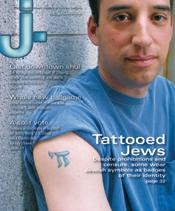The five week hiatus since my last blog post might be the longest dry spot I’ve had since starting this blog almost five years ago.
 But I have a good excuse — I’ve been working at Camp Tamarack all summer. As the camp rabbi I’ve fielded many questions, but by far the most common question I’ve received from counselors has been “the tattoo question.”
But I have a good excuse — I’ve been working at Camp Tamarack all summer. As the camp rabbi I’ve fielded many questions, but by far the most common question I’ve received from counselors has been “the tattoo question.”
Everyone wants to know if they will still be buried in a Jewish cemetery even though they have a tattoo. It’s remarkable how concerned twenty-year-olds are about an event far into the future that they won’t even be around to witness.
The sentiment that Jews with body art are barred from Jewish cemeteries has also been mentioned recently in a movie, a TV show, and in the mainstream media.
In the wonderful film “The Bucket List,” two cancer-stricken men, Carter (Morgan Freeman) and Edward (Jack Nicholson), plan to do some outrageous things before they “kick the bucket.” When Morgan Freeman’s character is somewhat hesitant about getting a tattoo, Jack Nicholson as Edward says to him: “What, are you afraid of not being able to be buried in a Jewish Cemetery?”
In an episode of “Curb Your Enthusiasm,” Larry David pays off a gravedigger to have his mother reburied in a Jewish cemetery despite a small tattoo on her rear end.
 And in the July 17th New York Times, the article titled “Hey Mom, the Rabbi Approved my Tattoo” (subtitled “Skin Deep: For Some Jews, It Only Sounds Like ‘Taboo’) also takes on the belief that Tattooed Jews can’t be buried in a Jewish cemetery.
And in the July 17th New York Times, the article titled “Hey Mom, the Rabbi Approved my Tattoo” (subtitled “Skin Deep: For Some Jews, It Only Sounds Like ‘Taboo’) also takes on the belief that Tattooed Jews can’t be buried in a Jewish cemetery.
By the time [Roberta] Kaplan’s daughter Liz Carnes, 49, had teenage daughters who wanted body art, Ms. Carnes knew how to dissuade them. “I’d say, ‘If you get a tattoo, you can’t be buried in a Jewish cemetery,’ ” said Ms. Carnes, the owner of a video equipment company in Carlsbad, Calif. “For no real reason, just that’s what my parents told me.”
Nearly every Jew, from those who go to synagogue only on holidays to those who dutifully follow Jewish law, has heard that adage. It has deterred many from being inked, even as tattoos have become widespread among N.B.A. players and housewives alike.
It seems that most young people are familiar with this warning about getting a tattoo. The only problem is that it is a myth! Thankfully, the NY Times article calls it an “urban legend.”
But the edict isn’t true. The eight rabbinical scholars interviewed for this article, from institutions like the Jewish Theological Seminary and Yeshiva University, said it’s an urban legend, most likely started because a specific cemetery had a policy against tattoos. Jewish parents and grandparents picked up on it and over time, their distaste for tattoos was presented as scriptural doctrine.
Rabbi Alan Lucas, in a 1997 teshuvah for the Conservative Movement’s Law Committee, took up the issue of body piercing and tattooing in Jewish law. The question he posed was: “Is body piercing (nose, navel, etc.) and tattooing permitted? Does it preclude taking part in synagogue rituals or being buried in a Jewish cemetery?”
He explains that the prohibition of tattooing is found in the Torah in Leviticus 19:28 where it states: You shall not make gashes in your flesh for the dead, nor incise any marks on yourselves: I am the Lord.
The mishnah explains that it is the lasting and permanent nature of tattooing which makes it a culpable act, but Rabbi Simeon disagrees and says that it is only the inclusion of God’s name which makes tattooing prohibited. Maimonides felt that tattooing should be prohibited because it was a form of idolatry since the pagans would tattoo themselves.
Rabbi Lucas maintains that:
Regardless of the exact limits of this prohibition, over time, the Rabbis clearly extended the prohibition to include all tattooing… In our day, the prohibition against all forms of tattooing regardless of their intent should be maintained. In addition to the fact that Judaism has a long history of distaste for tattoos, tattooing becomes even more distasteful when confronted with a contemporary secular society that is constantly challenging the Jewish concept that we are created b’tzelem Elohim, “In the Image of God,” and that our bodies are to be viewed as a precious gift on loan from God, to be entrusted into our care and not our personal property to do with as we choose. Voluntary tattooing even if not done for idolatrous purposes expresses a negation of this fundamental Jewish perspective.
Rabbi Lucas concludes that Tattooing is an explicit prohibition from the Torah, however, those who violate this may still be buried in a Jewish cemetery and participate fully in all synagogue ritual.
It seems to me that if a Jewish person chooses to get a tattoo that is in good taste and does not violate the Torah prohibitions of idol worship, then this act would not violate Jewish law since in our modern age tattoos can be removed (even if removal is a painful process and one that might need to be repeated several times). A tattoo that expresses ones Jewish pride is certainly not what the Rabbis of the Talmud had in mind when they discussed the tattooing practices of the pagans. And with regard to the “Auschwitz argument” against tattoos: body art in the 21st century certainly does not resemble the forced tattooing of Jewish men and women during the Holocaust.